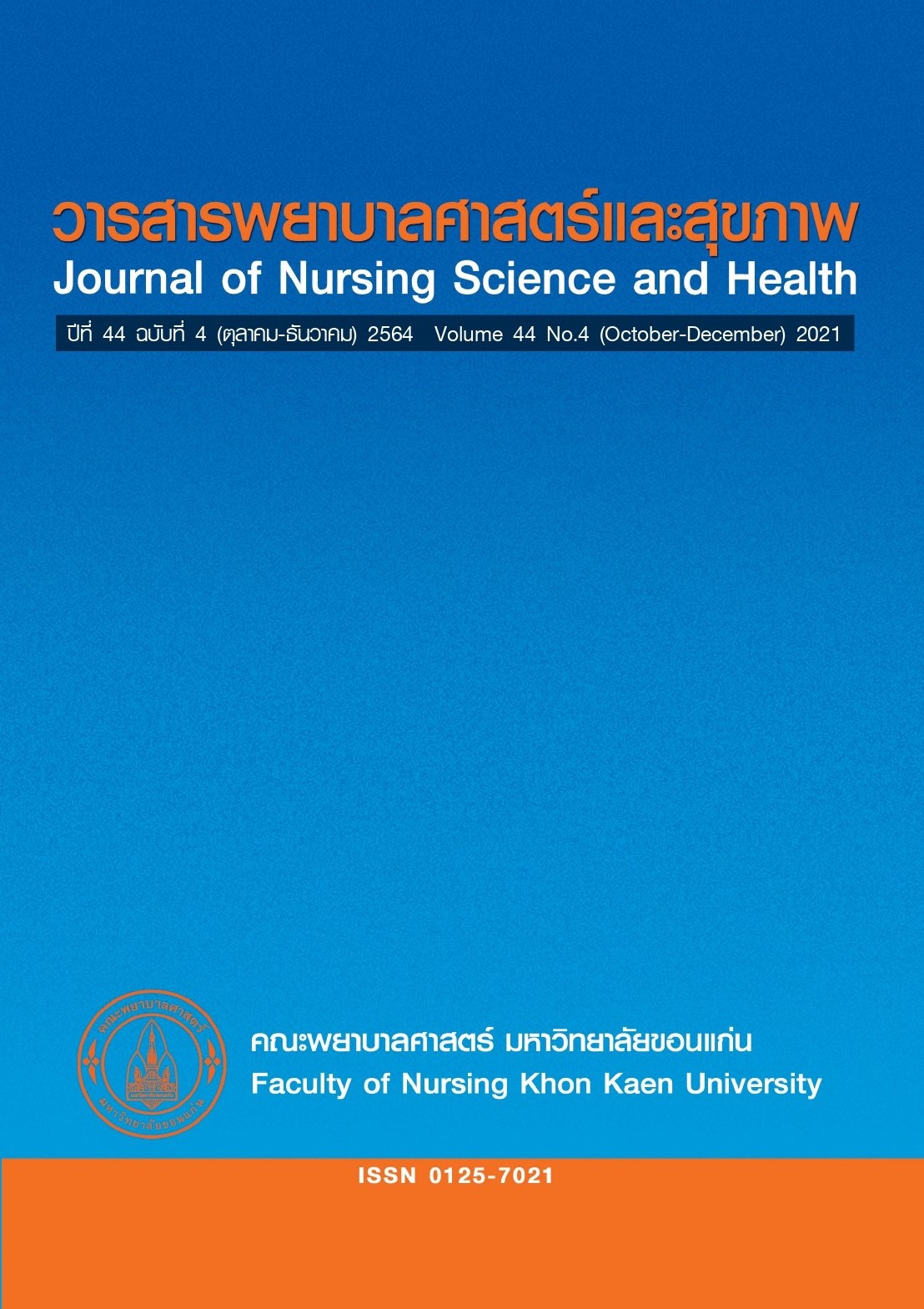ความรอบรู้ด้านสุขภาพกับการป้องกันโรคติดเชื้อไวรัสโคโรนา 2019 ของเด็กวัยเรียน
คำสำคัญ:
ความรอบรู้ด้านสุขภาพ, การป้องกันโรคติดเชื้อไวรัสโคโรนา 2019, เด็กวัยเรียนบทคัดย่อ
ท่ามกลางการแพร่ระบาดของโรคติดเชื้อไวรัสโคโรนา 2019 (COVID-19) การสนับสนุนและส่งเสริมความรอบรู้ด้านสุขภาพเป็นสิ่งจำเป็นสำหรับเด็กวัยเรียนทำให้เข้าใจและรู้ถึงลักษณะของโรค สาเหตุแนวโน้มการเกิดโรค ผลกระทบที่มีต่อการดำเนินชีวิต วิธีการป้องกันโรค และการรู้เท่าทันสื่อเทคโนโลยีเพื่อป้องกันและหลีกเลี่ยงการแพร่ระบาดของโรคติดเชื้อไวรัสโคโรนา 2019 หรือโรคโควิด 19 ที่มีการระบาดซ้ำอย่างรวดเร็วและรุนแรงมากขึ้น เป็นภัยเงียบใกล้ตัวที่เริ่มมีแนวโน้มจะพบได้ในกลุ่มวัยเด็กเพิ่มมากขึ้น และยังทำให้เกิดการเจ็บป่วยเรื้อรัง การป้องกันโรคจึงเป็นมิติหนึ่งที่สำคัญและจำเป็นของบุคคลในการดูแลสุขภาพตนเอง เพราะจะเป็นการเสริมภูมิคุ้มกันที่ดีและคุ้มค่าที่สุดให้กับร่างกายตั้งแต่เด็กวัยเรียนที่มีอายุ 6-12 ปีซึ่งการมีความรู้ทัศนคติระเบียบวินัย รับผิดชอบต่อสุขภาพตนเองและส่วนรวมที่ดีพอ จะช่วยลดความเสี่ยงต่อสุขภาพ จึงสามารถป้องกันและรักษาสุขภาพตนเองได้อย่างเหมาะสมต่อเนื่องจนเป็นนิสัยทั้งที่บ้าน โรงเรียน และชุมชนเพื่อลดโอกาสการแพร่กระจายของโรคโควิด 19 ได้ และเป็นการส่งเสริมสุขภาพเพื่อป้องกันโรคให้กับตนเอง ครอบครัว และสังคม ซึ่งจะนำไปสู่การพัฒนาการศึกษาและเศรษฐกิจของประเทศชาติให้ดียิ่งขึ้น
เอกสารอ้างอิง
Kriangburapa W. Coronavirus disease 2019 in children. BJM. 2020;7(1):96-102. (in Thai)
Worldometer. COVID-19 coronavirus pandemic [Internet]. Dover [USA]: Worldometers. info; 2021 [cited 2021 Sep 9]. Available from: https://www .worldometers.info/coronavirus/
Samakoses R. COVID-19 situation among Thai children (0-18 years old) since the outbreak of the new wave, April-11 August 2021 (weeks 15-33) [Internet]. Bangkok: The Royal College Pediatricians of Thailand; 2021 [cited 2021 Sep 1]. Available from: https://www.thaipediatrics.org/Media/media-20210901022138.pdf. (in Thai)
Gardner L. Mapping COVID-19 [Internet]. 2020 Jan [cited 2021 Sep 30]. Available from: https://systems.jhu.edu/research/public-health/ncov/
Wongchan W. Health literacy of prevention diabetes mellitus type 2 in school age children. JRTAN. 2019;20(2):1-9. (in Thai)
Soomprayoon S. Somdej Prince Mahidol Science to academic achievement. Bangkok: Chusawat; 2019. (in Thai)
Wattanaburanon A, Piyaaramwong P. Health education learning management in schools amidst the COVID-19 pandemic: Concepts and guidelines. Bamras J. 2020;14(3):192-202. (in Thai)
Wattanaburanon A, Sirichote M, Piyaaramwong P, Sattayathewa S. Perceptions and preventive behaviors of the COVID-19 among high school students in Bangkok, Thailand. Journal of Liberal Arts, Maejo University. 2021;9(1):36-49. (in Thai)
Schouten LR, van Kaam AH, Kohse F, Veltkamp F, Bos LD, de Beer FM, et al. Age-dependent differences in pulmonary host responses in ARDS: A prospective observational cohort study. Ann Intensive Care 2019; 9(1): 1-9.
Poovorawan Y. Impact of COVID-19 in Thailand. Thai Journal of Pediatrics. 2021; 60(2):81-3. (in Thai)
Poovorawan Y. Can COVID-19 be stopped with herd immunity?. Thai J Pediatr. 2021;60(3):165-7. (in Thai)
World Health Organization. The world health report 1998: Life in the 21st Century a Vision for All: Executive Summary. Geneva: WHO; 1998.
Tachavijitjaru C. Health literacy: A key indicator towards good health behavior and health outcomes. JRTAN. 2018;19 Suppl 1:1-11. (in Thai)
Wae A. COVID-19 and learning to change health behaviors today. Journal of The Health Education Professional Association. 2020;35(1):24-9. (in Thai)
He F, Deng Y, Li W. Coronavirus disease 2019: What we know? J Med Virol. 2020; 92:719-25. doi: 10.1002/jmv.25766
Zhu N, Zhang D, Wang W, Li X, Yang B, Song J, et al. A novel coronavirus from patients with pneumonia in China, 2019. N Engl J Med. 2020;382:727-33. doi: 10.1056/NEJMoa2001017
Molloy EJ, Bearer CY. COVID-19 in children and altered inflammatory responses. Pendiatr Res. 2020;88:340-1. doi: 10.1038/s41390-020-0881-y
Karnjanapiboonwong A, Kaewtha S. The effects of COVID-19 outbreak with control measures to non-communicable disease risk behavior among Thai people during April 2020. Dis Control J. 2020;46:551-64. (in Thai)
Vizard T, Sadler K, Ford T, Newlove-Delgado T, McManus S, Marcheselli F, et al. Mental health of children and young people in England, 2020. [Internet]. 2020 Oct [cited 2021 Jun 15] Available from:https://files.digital.nhs.uk/AF/AECD6B/mhcyp_ 2020_rep_v2.pdf
Intarakamhang A. Health literacy: Measurement and development. Bangkok: Sukumvit; 2017. (in Thai)
Kaeodumkoeng K, Trepeturai N. Health literacy. Nonthaburi: Division of Health Education, Department of Health Service Support Ministry of Health; 2011. (in Thai)
Mancuso JM. Health literacy: A concept/dimensional analysis. Nurs Health Sci. 2008;10:248-55.
Sarayuthpitak J. School health program. 3rd ed. Bangkok: Chulalongkorn University printing; 2018. (in Thai)
UNICEF Thailand. How teachers can talk to children about coronavirus disease (COVID-19) [Internet]. 2020 Mar [cited 2021 Jul 1]. Available from: https://www. unicef.org/thailand/coronavirus/how-teachers-can-talk-children-about-coronavirus-disease-covid-19
Ministry of Education Thailand. Basic education core curriculum B.E. 2551 (A.D. 2008) [Internet]. Bangkok: Bureau of Academic Affairs and Educational Standards; 2009 [cited 2021 Sep 9]. Available from: https://neqmap.bangkok.unesco.org/wp-content/uploads/2019/06/Basic-Education-Core-Curriculum.pdf
ดาวน์โหลด
เผยแพร่แล้ว
รูปแบบการอ้างอิง
ฉบับ
ประเภทบทความ
สัญญาอนุญาต
วารสารพยาบาลศาสตร์และสุขภาพเป็นเจ้าของลิขสิทธิ์ในการเผยแพร่ผลงานที่ตีพิมพ์ห้ามผู้ใดนำบทความที่ได้รับการตีพิมพ์ในวารสารพยาบาลศาสตร์และสุขภาพไปเผยแพร่ในลักษณะต่าง ๆ ดังนี้ การนำบทความไปเผยแพร่ออนไลน์ การถ่ายเอกสารบทความเพื่อกิจกรรมที่ไม่ใช่การเรียนการสอน การส่งบทความไปตีพิมพ์เผยแพร่ที่อื่น ยกเว้นเสียแต่ได้รับอนุญาตจากวารสารพยาบาลศาสตร์และสุขภาพ



